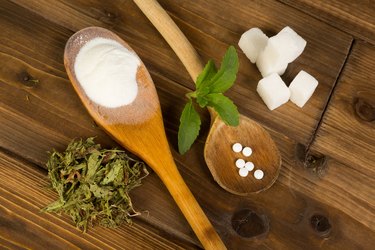
Sugar and stevia are natural sweeteners that have been used around the world for centuries, though stevia as a sweetener is relatively new to the U.S.
Exchanging stevia for sugar in your diet could help you limit your daily calorie intake and ward off diabetes, but a lack of long-term research means that little is known about its effect on things like weight management.
Video of the Day
Video of the Day
What Is Stevia?
There's nothing artificial about stevia. Stevia is derived from a plant that's native to South America, where it's been eaten for more than 200 years.
Its leaves contain a naturally sweet compound called rebaudioside A (reb A), according to a May 2015 article in Nutrition Today, and South Americans would dry the leaves and use them to sweeten teas and medicines.
Stevia was first commercially used as a sweetener in the 1970s in Japan. The U.S. Food and Drug Administration (FDA) approved reb A in 2008, categorizing it as "Generally Recognized as Safe (GRAS)," allowing stevia to be sold commercially in powdered or extract form.
Whole-leaf stevia has not been approved as a food additive, but it can be purchased as a dietary supplement.
Stevia vs. Sugar
Like stevia, sugar is a natural substance, but it's made by processing the plant's sugar cane or sugar beets (instead of the stevia plant), according to Harvard University.
Sweetener Calorie Comparison
Chemically speaking, sucrose — also known as cane or table sugar — is made up of glucose bound to fructose. Nutritionally speaking, sugar is classified as a carbohydrate and, like all carbohydrates, contributes 4 calories per gram to your diet. Each teaspoon of sugar contains 16 calories, according to the USDA.
Stevia, on the other hand, is calorie-free because it passes through your body without metabolizing, according to Nutrition Today.
In terms of sweetness, reb A is up to 400 times sweeter than sugar, according to the Academy of Nutrition and Dietetics. This means you can use less stevia to achieve the same amount of sweetness that sugar would provide.
Which Sweetener Is Healthier?
This makes stevia preferable to sugar, particularly for those who have prediabetes or diabetes, because it won't raise blood sugar, according to the Cleveland Clinic.
But, even if you don't have diabetes, sugar can still cause health issues. Sucrose can contribute to taking in too many calories, weight gain and an increased risk for type 2 diabetes, according to a January 2018 review in the Journal of Medicinal Plants Studies. Sugar is also problematic for your teeth, as added sugars are the primary cause of dental cavities, the review notes.
Meanwhile, a July 2018 review published in The Journal of Nutrition reported that stevia did not negatively affect blood sugar in people with or without diabetes.
The sweetener could possibly be a tool for lowering calorie intake, which may help manage or prevent obesity.
Is Stevia a Safe Alternative to Sugar?
The FDA deems stevia safe, though there are limits to how much you should eat.
The Acceptable Daily Intake (ADI) for stevia is 4 milligrams per kilogram of body weight per day, according to Nutrition Today. So for someone who weighs 150 pounds, that equates to 272 milligrams of stevia — equal to about 40 packets of stevia per day. That's a lot.
The Downsides of Stevia
It Might Not Lead to Weight Loss
Although choosing stevia over sugar can help reduce the number of calories you take in on a daily basis, it's not a panacea for weight loss.
Research doesn't currently support the notion that nonnutritive sweeteners, such as stevia, can be beneficial for weight management, according to a July 2017 review in the Canadian Medical Association Journal.
Plus, eating sugar substitutes may lead to cravings for more sweet foods, according to the Cleveland Clinic.
It Has an Aftertaste
Both sugar and stevia can be used for baking, but stevia will not brown baked goods the way sugar does, according to Texas A&M Agrilife Extension.
It also has a slightly different flavor than sugar and can leave a bitter aftertaste.
- Nutrition Today: "Stevia, Nature’s Zero-Calorie Sustainable Sweetener"
- Academy of Nutrition & Dietetics: "Taking a Closer Look at Stevia"
- Cleveland Clinic: "The 5 Best (and Worst) Sweeteners You Can Eat"
- Harvard University: "Natural and Added Sugars: Two Sides of the Same Coin"
- MyFoodData.com: "Sugar"
- Texas A&M Agrilife Extension: "Baking with Sugar Alternatives"
- Journal of Medicinal Plants Studies: "Effect of Stevia Rebaudiana, Sucrose and Aspartame on Human Health: A Comprehensive Review"
- Canadian Medical Association Journal: "Nonnutritive Sweeteners and Cardiometabolic Health: A Systematic Review and Meta-Analysis of Randomized Controlled Trials and Prospective Cohort Studies"
- The Journal of Nutrition: "Stevia Leaf to Stevia Sweetener: Exploring Its Science, Benefits and Future Potential"
- T. Colin Campbell Center for Nutrition Studies: "Is Stevia the Safest Sweetener?"